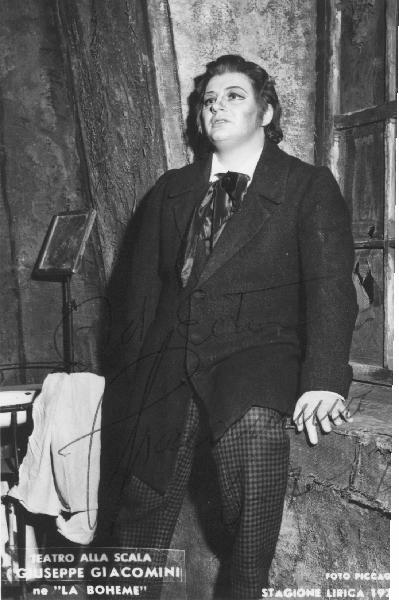Giuseppe Giacomini
7 September 1940 Veggiano – 28 July 2021 Voltago Agordino
Giacomini studied voice with various teachers, was never really satisfied with the results,
and in the end devised his own technique; quite successfully, since his was the rare example of a truly muscular voice that
could nonetheless be tamed to piano singing. At least as time went by – he was one of those singers who get better
with age. In his youth, he was prone to show-off singing and to shouting, but in his mature years, he was the epitome
of a heroic Italian tenor: wonderful burnished timbre yet resounding, steely brilliant high notes. (Although admittedly, he
had really lousy evenings a tad more often than other singers; evenings when the voice absolutely refused to obey its master.
That was simply part of him and his career, and so one example is among the below recordings.)
Giacomini made his debut in 1966 in Vercelli as Pinkerton. After few years in the Italian provinces, he sang Puccini's des
Grieux in Berlin in 1970, which got his career really started. It's useless to list all the important theaters where he sang,
because he sang at literally all important theaters on this planet; particularly often at Covent Garden, the Metropolitan
Opera (85 performances from 1976 to 1988), the Vienna Staatsoper (74 performances from 1977 to 2001) and the Arena di Verona.
His repertory wasn't very large; his favorite roles were Luigi and Otello, and probably his best were Canio, Andrea
Chénier and Radamès. Unfortunately, like many singers, he missed the right time to retire, and sang (particularly in
the Far East) at an age and in a condition when he definitely shouldn't have.
His great career and great qualities notwithstanding, he was anything but a star; his personality had simply nothing star-like
at all. He was brooding, grumpy, and very shy, didn't enjoy the contact with his fans the slightest bit.
In RA format
In RA format
In RA format
In RA format
In RA format
In RA format
In RA format
I wish to thank Helmut Krautschneider for the recordings (Fanciulla del West).
I wish to thank Thomas Silverbörg for the recordings (Chénier, Gioconda).
|
